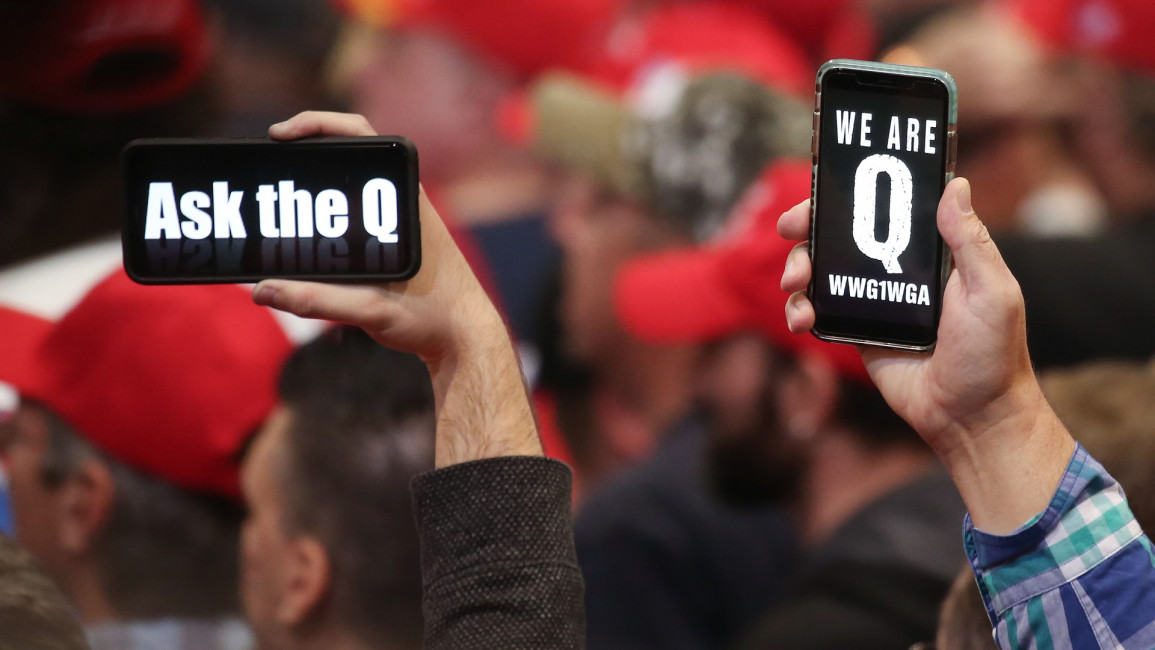Follow us on Facebook, Twitter and Instagram to stay connected
Donald Trump refuses to denounce far-right conspiracy group QAnon in fiery TV exchange
Donald Trump refuses to denounce far-right conspiracy group QAnon in fiery TV exchange
The US President has refused to condemn a far-right conspiracy group that has been classed a domestic threat by the FBI.
2 min read
Many QAnon conspiracy theorists support President Trump [Getty]
US President Donald Trump refused to denounce far-right conspiracy group QAnon during a fiery debate, claiming that "they are very much against paedophilia" and he agrees with that idea.
The US president appeared on NBC News to talk about the upcoming election.
During a particularly intense exchange, news anchor Savannah Guthrie asked Trump if he could unequivocally state that the conspiracy theories peddled by QAnon are false.
"I know nothing about QAnon," he stated.
"I just told you," Guthrie said.
"What you tell me doesn’t necessarily make it fact" Trump hit back.
Many followers of the QAnon conspiracy are also supporters of Trump.
The QAnon movement, whose followers have been labelled a domestic terror threat by the FBI, have pushed a number outlandish theories: Principally, they believe that Trump is engaged in a secret war against Satan-worshipping paedophiles positioned in the government, business and media.
Followers believe in the existence of a "deep state" push to destroy Trump.
They have also falsely stated that 5G cellular networks are spreading coronavirus.
None of these theories are based in fact.
Earlier this year Trump was embroiled in another QAnon controversy after he retweeted a conspiracy theory from an account linked to QAnon, in which it claimed – without proof – that former Vice President and Democrat presidential candidate Joe Biden planned to have Seal Teal Six killed in order to cover up the fake death of al-Qaeda founder Osama bin Laden.
During the NBC townhall, he back-peddled on the retweet.
"I know nothing about it," he said. "That was a retweet – that was an opinion of somebody. And that was a retweet.
"I’ll put it out there. People can decide for themselves."
"I don’t get that," Guthrie shot back. "You’re the president. You’re not like someone’s crazy uncle who can retweet whatever."
"I don't know much about the movement other than I understand they like me very much, which I appreciate," Trump said in August.
"I have heard that it's gaining in popularity," Trump said.
"I've heard these are people that love our country and they just don't like seeing it."
QAnon origins
The conspiracy group is thought to have its origins on the imageboard website 4chan.
In October 2017 an anonymous user posted several posts about the United States and signed it off as "Q". The user claimed to have US security level "Q clearance".
What followed is messages written in cryptic language appearing at Trump rallies and online, referred to by supporters as "Q drops" or "breadcrumbs".
Studies show most Americans haven’t heard of QAnon, BBC reported.
The US president appeared on NBC News to talk about the upcoming election.
During a particularly intense exchange, news anchor Savannah Guthrie asked Trump if he could unequivocally state that the conspiracy theories peddled by QAnon are false.
"I know nothing about QAnon," he stated.
"I just told you," Guthrie said.
"What you tell me doesn’t necessarily make it fact" Trump hit back.
Many followers of the QAnon conspiracy are also supporters of Trump.
The QAnon movement, whose followers have been labelled a domestic terror threat by the FBI, have pushed a number outlandish theories: Principally, they believe that Trump is engaged in a secret war against Satan-worshipping paedophiles positioned in the government, business and media.
Followers believe in the existence of a "deep state" push to destroy Trump.
They have also falsely stated that 5G cellular networks are spreading coronavirus.
None of these theories are based in fact.
Earlier this year Trump was embroiled in another QAnon controversy after he retweeted a conspiracy theory from an account linked to QAnon, in which it claimed – without proof – that former Vice President and Democrat presidential candidate Joe Biden planned to have Seal Teal Six killed in order to cover up the fake death of al-Qaeda founder Osama bin Laden.
|
During the NBC townhall, he back-peddled on the retweet.
"I know nothing about it," he said. "That was a retweet – that was an opinion of somebody. And that was a retweet.
"I’ll put it out there. People can decide for themselves."
"I don’t get that," Guthrie shot back. "You’re the president. You’re not like someone’s crazy uncle who can retweet whatever."
"I don't know much about the movement other than I understand they like me very much, which I appreciate," Trump said in August.
"I have heard that it's gaining in popularity," Trump said.
"I've heard these are people that love our country and they just don't like seeing it."
QAnon origins
The conspiracy group is thought to have its origins on the imageboard website 4chan.
In October 2017 an anonymous user posted several posts about the United States and signed it off as "Q". The user claimed to have US security level "Q clearance".
What followed is messages written in cryptic language appearing at Trump rallies and online, referred to by supporters as "Q drops" or "breadcrumbs".
Studies show most Americans haven’t heard of QAnon, BBC reported.



